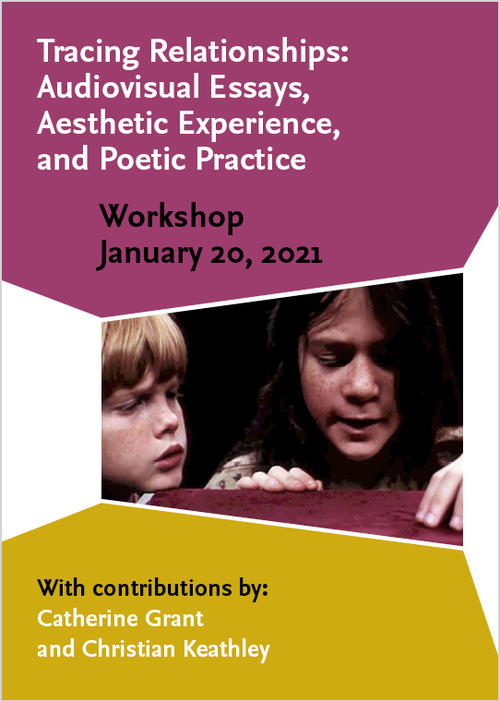Tracing Relationships: Audiovisual Essays, Aesthetic Experience, and Poetic Practice
20.01.2021 | Digital workshop by the Cinepoetics group with Catherine Grant and Christian Keathley.
Research Focus: Beyond Spectatorship
This semester's third digital workshop was aligned to the topics of videographic research and audiovisual essays. Therefore, two prolific practitioners in this field, Catherine Grant and Christian Keathley, were invited to talk about their creative process as well as the relationship between academic research and poetic practice. As it happens, Grant elaborated on her Cinepoetics Lecture exactly a year ago about the topic of intertextuality in audiovisual essays, which she continued in this year's talk.
But first, Grant and Keathley were introduced by Christina Schmitt and Eileen Rositzka, who contextualised the workshop within the broader research of Cinepoetics. Rositzka highlighted several links to a previous research focus about Eisenstein and to different workshops on methods of mapping cinema, on methods of essayistic writing and continuous working group meetings on the essayistic form in cinema and literature. Therefore, in this context, the workshop focused on methods of grasping the cinematic image as a poetic experience.
Catherine Grant started her talk with a recapitulation of last year's Cinepoetics Lecture, presenting her practice as a maker and scholar. It is a practice of engaging with forms of exploration, which she derives from Whitehead’s notion of "Gestaltung". In other words, we need a temporal and spatial forming and arranging of audiovisual footage to delve into the theme of filmic intertextuality. Through this process knowledge is generated, whether it may be in academic or artistic context.
In her talk "The Poeisis of Aesthetic Experience: Video-Essay Explorations of Anagnorisis and the 'Unthought Known'", she further elaborated on her recent research focus: cryptography. Here, she underlined the importance of anagnorisis, the moment of recognition in ancient tragedies. Grant described how receiving a long-awaited DVD of an adaptation of James Joyce's "The Death" a few days prior to the workshop set off a bodily reaction and a wave of explorative energy. On the one hand, an exploration of intertextuality, as it reminded her of Viaggio in Italia, on the other hand also of her family roots, as she can trace back her ancestors to Joyce's acquaintances. Therefore, her practice takes on an ambivalent form of seeking truth and solving riddles, revealing with sensuous methods new connections between her autobiographical adoption story and her scholarly work. Thus, the essayistic form with its ellipses suits this process of discovery and recognition. Hence it is a forming and arranging, decoding and "gestalten" of cryptographic processes of adaption/adoption stories and exploring the family tree of audiovisual intertextuality.
Afterwards, Christian Keathley presented his work on "Research Method as Poetic Practice: The Case for 'Mystory'". He started from his early interest in film and his developing cinephilia, which merged later on with his academic work on critical theory. Through his research on critical theory, he engages in modes of adapting essays and experimental critical writing in an academic context. In combination with questions of adapting and his own adoption story, this leads to different modes and explorations as well as his practice as a video essayist. He combines professional, personal and communal registers. Therefore, his work is guided by clues and fragments, which are combined and put in a relationship and – in turn – might form an uncanny correspondence. In concordance to Grant's ideas, he poses the idea of play, of exploration and emotional response as key aspects of his work. It is largely an imaginary process, in which the in-between of those elliptic moments, the intermediate areas, the mingling of interior and exterior generate a play, in which the three different registers lead to discovery.
Jan-Hendrik Bakels and Danny Gronmaier led the ensuing two-part discussion which revolved around multiple ideas that came up in the prior talks and brought up topics like cultural obsessions of finding one's own origins, the rhizomatic order as a new way of contextualising films in movements and lineages, the development or change of cinephilia in the digital era, the influences of Godard and Wittgenstein in their works and a different mode of thinking about the spectator as the medium and the archive of the audiovisual material and a lot of "puncepts".
